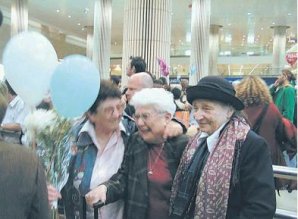
ELLA FRIEDVALD and her sister Lila embrace their cousin Krystyna, whom they hadn't seen in 66 years, at Ben-Gurion Airport
Photo: courtesy
For 66 years, Ella Friedvald, 82, and her 79-year-old sister Lila were sure that their cousin Krystyna had been killed in the Holocaust, just as she was convinced they were long dead. After all, the three women were barely teenagers when the Germans invaded Poland and their families were separated, their paths seemingly forever split as their world shattered before them.
After the war, Ella and Lila settled in Israel, while Krystyna, 79, made her home in the US, all having failed to find traces of their respective parents. But, as fate willed it, a faded postcard sent from a German labor camp 60 years ago and the determination of a very persistent octogenarian to claim her family's pre-war life insurance benefits led to their reunification here this week.
The Friedvald girls grew up in Warsaw in the 1930s. After the Nazis invaded Poland, their families fled to Lvov, at the time still part of Poland, but under Soviet control. Although they escaped the Germans, Ella, Lila and their parents were forcibly taken by the Soviets to a closed labor camp, while Krystyna and her parents eventually made their way back to Warsaw once the Germans entered Lvov.
Krystyna's last childhood memory of her two cousins was that of her father racing to the train station in Lvov in the hopes of bribing the Russian soldiers to free the two girls, only to come back home empty-handed having failed to find the family at the station. Her last piece of information about her cousins for the next six and half decades was a letter that Lila wrote her from the Soviet camp in which she said that her parents and older sister were dying of hunger.
The two sisters were indeed soon orphaned, but they managed to survive the war, and eventually made their way to Israel where they married and had families. Their cousin's parents fared no better than their own, as both were killed by the Nazis in Warsaw. But young Krystyna, who was living on the Aryan side of the city and who took part in the Warsaw uprising, managed to survive the war against all odds, largely since the Germans had no clue that the Polish-speaking teen was Jewish.
After the Nazis crushed the Polish rebellion, she was taken, together with a group of Poles, to a labor camp in Germany, where she remained until the war ended with the Red Army liberating the camp. While she was still at the camp, Krystyna sent out postcards to various places in Poland in search of family members and friends, but they were returned to the camp with no such persons found. "I was positive they were dead," Krystyna told The Jerusalem Post, "and they were sure I was killed with the rest of the Jews of Poland."
After the war, Krystyna's uncle brought her to England, where she would meet her future husband. After the young couple married, they decided to move to the US since they did not want to start a family in war-ravaged Europe. For the next 50 years, Krystyna, of Eastchester, NY, was unaware that her two cousins were alive and well in Israel.
Then, five years ago, her cousin Ella began to make inquires about possible remuneration from the Generali company for life insurance taken out by her family members before the war. The Polish offices of the company did not find any policies for her parents or grandparents but they did find one for her cousin's father. Ella Friedvald then contacted a Polish organization of authors and composers, where he had worked, to see if they had any record of him. The organization wrote back that their cousin had informed them in a letter in 1947 that her father had been killed in 1942.
That letter opened up a whole new world for them. "At that moment we knew that she had survived the war," Ella said. The next thing to do was to see if she were still alive. Coincidentally, around the same time that Ella began to make inquiries, her cousin had answered an advertisement put out by the Polish Consulate in New York in search of survivors of the Warsaw uprising.
A representative of the consulate then visited Krystyna in her home, and when he asked her if she had any memento for a museum to mark the uprising, she gave him a postcard she had written from the German labor camp 60 years earlier that had been stamped "return to sender." The Polish official was very happy with the postcard, and the museum subsequently put it on its Internet site, which would prove critical in her cousins' search for her, which they carried out with the help of two Polish friends. Last month, Krystyna Friedvald got a call from the Polish museum. "Someone is looking for you," the voice on the other line said in Polish. "Who?" she asked. The museum staffer asked her if she had any cousins, using their married names. Krystyna said she did not know of any such people. "How about Ella and Lila?" the voice - like a dream out of the past - asked. "Where are they?" Krystyna cried, thinking her cousins were in Poland. "They are in Israel," came the reply. The next morning at 5 a.m. Krystyna's phone rang. It was her long-lost cousin calling from Israel. "We talked and we talked and we talked," she said.
The following week Krystyna was on a plane to Israel to reunite with her cousins. After 66 years, the three, who look remarkably alike and who communicate with each other in Polish, were clearly trying to squeeze a lifetime into Krystyna's one-week visit, her first ever to Israel.
"It's these two stubborn ladies, they decided to find me," she concluded with a smile.

No comments:
Post a Comment